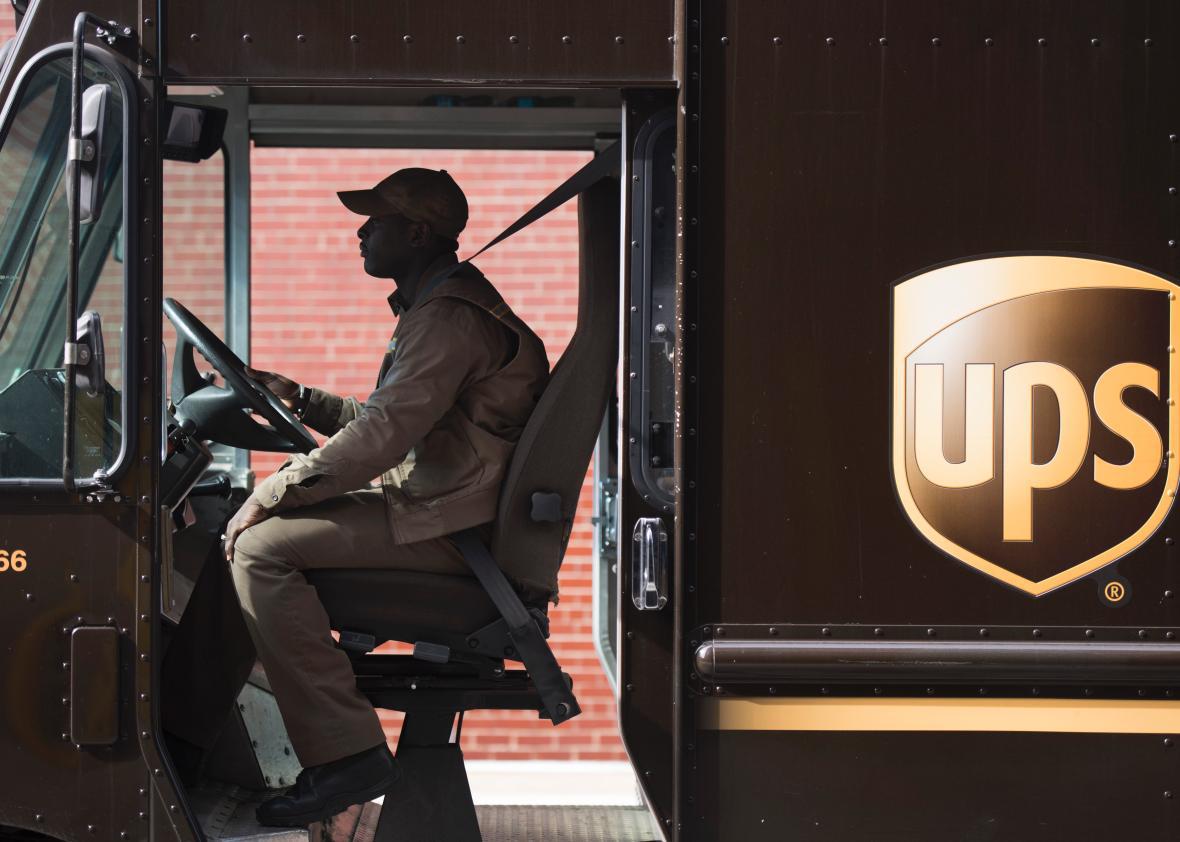The Wall Street Journal reported Tuesday morning that delivery giant UPS will add a small shipping surcharge for packages this holiday season. Between Nov. 19 and Dec. 2—the period including Black Friday and Cyber Monday—and again between Dec. 17 and Dec. 23, shippers will pay an additional 27 cents for ground shipments (and an additional 81 cents for next-day air delivery). This is, in a word, awesome.
Yes, higher prices for widely used services aren’t usually a cause for celebration. But there are several reasons why this is good news.
First, the unilateral imposition of across-the-board charges on something resembling a utility—everyone uses UPS and its competitors—is inflationary. And we badly need some inflation in this country. For nearly a decade, the Federal Reserve, which is charged with maintaining inflation at a 2 percent annual rate, has been failing to meet this goal. There are a host of immense deflationary forces afoot in the economy—the margin-killing efficiency of Amazon, cheap oil, automation, the decline of organized labor. These powerful forces can’t be overcome by the Federal Reserve’s highly permissive monetary policies. We desperately need some big players in the market to insist on higher prices and on the higher wages that should follow.
Second, these higher prices are highly likely to lead to higher wages. UPS and other logistics companies are very well-oiled machines. They handle an astonishing number of packages with comparatively little error every day. Their interconnected systems of airplanes, trucks, and distribution centers can handle an immense amount of throughput. But in America, we insist on cramming a disproportionate share of consumer spending (and hence of package delivery) into a six-week period at the end of the year.
For that reason, all the players in the holiday shopping ecosystem—retailers, department stores, e-commerce companies, and delivery services—hire hundreds of thousands of temporary employees in November and December. Last year, UPS alone hired 95,000 seasonal workers.
But hiring large numbers of seasonal workers is becoming progressively more difficult. We’ve had a record 80 straight months of payroll job growth, the unemployment rate is 4.3 percent, and there are 6 million open positions in the U.S. One of UPS’s biggest facilities is in Louisville, Kentucky, a city that already has 30,000 unfilled job openings. All of which means that if you have an urgent need to fill lots of positions this year, you’re going to have to use the blunt instrument of sharply higher wages. UPS is adding the surcharge precisely because it believes it will have to spend significantly more on labor this year. We’ve been waiting for our long recovery to meaningfully raise wages. Here is one example of how that is actually happening.
Third, the move will be a small source of succor for suffering brick-and-mortar chains. Forcing people to pay 27 cents more for a parcel for a few weeks out of the year won’t stem the e-commerce tide that is slowly swamping America’s malls. But at the margins, it may help. Some e-tailers will respond by passing through higher costs to their customers. (Others, like Amazon, may simply eat the costs for the sake of maintaining and growing market share.) And some consumers will respond to the higher shipping costs by deciding to go to the mall or store on their own.
Finally, the planned surcharges represent a small step toward making consumers burden the actual costs of the benefits the economy is delivering to them. One of the great things about the internet age is the immense consumer surplus it has created. Because our systems today enable the delivery of goods and services for much cheaper (and sometimes for nothing), and because a lot of companies are willing to run on very small or negative margins (hello, Uber), the consumer is getting an immense surplus. We have all the content and music we can consume for cheap or (thanks to advertising) free, goods are delivered to our home for very low prices, cars that appear out of nowhere to whisk us to our desired destination for a few dollars. But there is a price to be paid for all this cheapness. My surplus is often somebody else’s deficit: the companies and artists who can’t get paid (or paid decently) for the content they produce, the exploited port truck drivers who work at very low wages (go read this searing USA Today investigation), warehouse workers who labor to the point of exhaustion, and so on.
The problem is that many of the companies that possess the size and market presence to influence pricing, and hence wages, have been unwilling to pass on higher costs to their consumers. In fact, in many instances, their business models have been explicitly built around denying adequate compensation to suppliers and workers.
Eight years into the expansion, UPS’s decision may represent a small hole in the dam that has been holding the tide back from lifting all boats.
